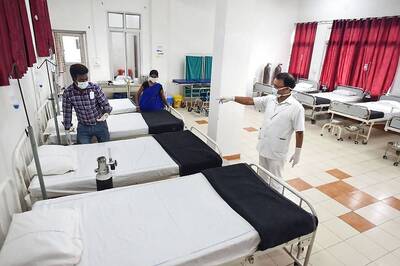
views
UNITED NATIONS: The U.N. logistics chief said Tuesday that closing down the joint U.N.-African Union peacekeeping operation in Sudans western Darfur region is proceeding on schedule, though with some hiccups.
Undersecretary-General for Field Support Atul Khare told the Security Council problems include troops seeking asylum in Sudan, thefts at 10 sites handed over to local authorities and armed groups stationing forces around the main remaining logistics base.
Khare said the initial milestone it set of withdrawing all uniformed personnel and staff not involved in closing the mission by June 30 was achieved. Almost 6,000 soldiers and police returned to their home countries, nearly 1,200 staff are gone and only 360 police remain to secure the El Fasher logistics base and personnel wrapping up the mission, he said.
Khare said the U.N. also ensured that uniformed peacekeepers who wanted to seek asylum were processed by Sudanese refugee authorities. He said he was grateful that the status of these individuals in seeking asylum is a humanitarian act, not based on political considerations.
The vast Darfur region was gripped by bloodshed in 2003 when rebels from the territorys ethnic central and sub-Saharan African community launched an insurgency accusing the Arab-dominated government in Khartoum of discrimination and neglect.
The first joint U.N.-AU force known as UNAMID was established in 2007 and terminated by the Security Council last Dec. 31. It was replaced with a much smaller and solely political mission, with a deadline to shut down by June 30, 2022.
In early December, Khare warned the council that closing down one of the largest peacekeeping operations involving the U.N. would be a major undertaking. He said the missions personnel were spread out at El Fasher, mission headquarters in Zalingei, 13 team sites and in the capital Khartoum and Port Sudan. Besides equipment deployed with the 22 military and police contingents, Khare said the mission had more than 10,000 assets plus inventory.
Khare told the Security Council on Tuesday that the personnel departures took place in parallel to the closure and handover of the former mission headquarters and 13 team sites to local authorities in Darfur for civilian use.
The facilities and equipment handed over to local authorities to date, outside El Fasher, had a residual value exceeding $41 million, he said.
Khare said confirmed and unconfirmed reports suggest varying degrees of destruction and theft at 10 of the 14 sites handed over to local authorities. While these assets no longer belong to the United Nations, he said, they are major losses for the communities involved.
The destruction and thefts are being investigated and some Sudanese suggest the incidents resulted from underlying tensions among groups locally, along with concerns, whether real or perceived, surrounding equitable access to the facilities and equipment that was handed over, Khare told the council.
On a positive note, he said the substantial Zalingei headquarters site was gradually and successfully turned over to local authorities for use by the local university.
Khare said he told Sudanese officials during a visit earlier this month that the U.N. intends to proceed with a similar phased handover of the El Fasher base beginning in November.
Khare said El Fasher has the capacity to form a substantial community with extensive office infrastructure, more than 1,000 self-contained living units, significant work and learning spaces, a hospital, a major fuel storage depot, recreational facilities, maintenance and vehicle workshops, large warehouses, water purification and distribution lines, a communications tower, and other facilities.
In addition, he said, a lot of moveable equipment and supplies have been consolidated at El Fasher, including hundreds of vehicles, generators, furniture and information and communications technology equipment.
It is critical that the government of Sudan makes every effort to ensure that this enormous reserve of facilities and equipment is sustainably applied to national imperatives for civilian use, Khare said.
For this to happen in an orderly and speedy fashion, he said, the government and local officials must address the issue of armed movements” stationed around the El Fasher compound.
Units from at least five different groups, as well as the Sudanese Armed Forces, have been identified by colleagues based in El Fasher, Khare said.
He said initial confusion among the groups disrupted UNAMID movements and led to some harassment of U.N. personnel and vendors. In recent weeks, Khare said, movements have mostly proceeded normally.
Khare said equipment valued at $8.1 million has been transferred to other U.N. operations.
Disclaimer: This post has been auto-published from an agency feed without any modifications to the text and has not been reviewed by an editor
Read all the Latest News, Breaking News and Coronavirus News here.

















Comments
0 comment